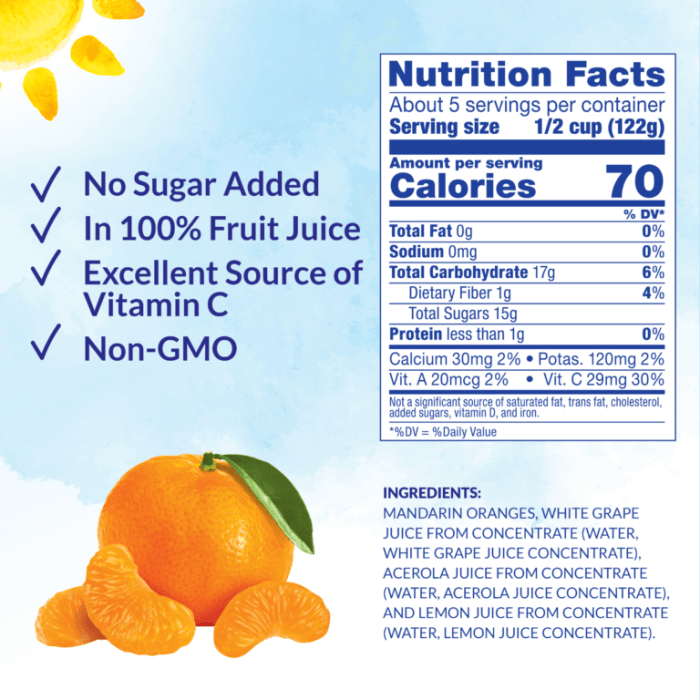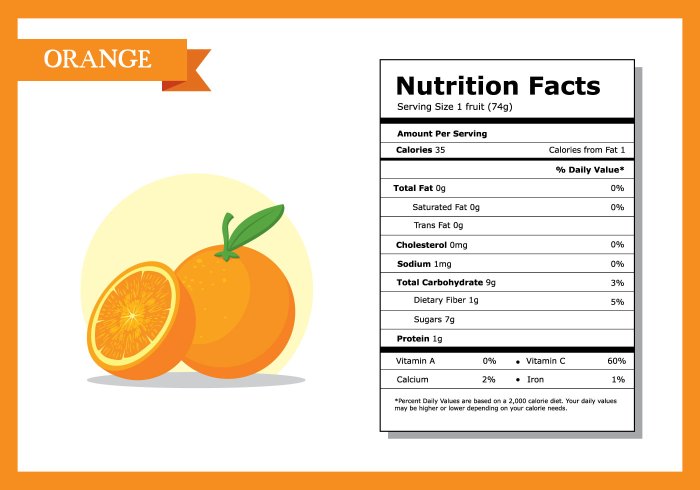Nutritional Composition of Mandarin Oranges
Nutrition facts for mandarin oranges – Alright, peeps! Let’s dive into the juicy details of those little sunshine spheres we call mandarin oranges. Forget the boring nutrition lectures – we’re gonna make this fun, I promise. Think of it as a delicious adventure for your taste buds AND your body.
Mandarin oranges are packed with goodness, a tiny powerhouse of nutrients. They’re not just a sweet treat; they’re a serious contender in the healthy snack game. So, let’s break down exactly what makes them so awesome.
Macronutrient Breakdown of Mandarin Oranges
Now, let’s get down to the nitty-gritty: the macronutrients. This is where we talk about the carbs, fats, and proteins – the building blocks of your energy and overall well-being. Remember, these values are approximate and can vary slightly depending on the size and type of mandarin orange.
| Nutrient | Amount per Serving (approx. 1 medium mandarin) | % Daily Value (approx.) | Unit of Measurement |
|---|---|---|---|
| Carbohydrates | 10g | 4% | grams |
| Sugars | 8g | – | grams |
| Fiber | 1g | 4% | grams |
| Fat | 0.2g | 0% | grams |
| Protein | 0.5g | 1% | grams |
Vitamin and Mineral Content of Mandarin Oranges
Beyond the macronutrients, mandarin oranges are a treasure trove of vitamins and minerals. These micronutrients play crucial roles in various bodily functions, from boosting your immune system to keeping your bones strong. Think of them as the secret agents of your health.
- Vitamin C: A powerful antioxidant, essential for immune function and collagen production. One mandarin can provide a significant portion of your daily Vitamin C needs.
- Folate: Crucial for cell growth and development, particularly important during pregnancy.
- Potassium: An electrolyte vital for maintaining healthy blood pressure and fluid balance.
- Vitamin A: Supports vision, immune function, and cell growth. While not as abundant as Vitamin C, mandarins still contribute to your daily intake.
Fiber Content and Digestive Health
Let’s talk fiber, my friends! That 1 gram of fiber per serving might seem small, but it plays a BIG role in your digestive health. Fiber adds bulk to your stool, preventing constipation and promoting regular bowel movements. Think of it as a gentle sweep for your gut, keeping things running smoothly. A healthy digestive system is a happy digestive system, and mandarin oranges contribute to that happiness.
Mandarin Oranges in a Balanced Diet

Okay, so we’ve established that mandarin oranges are nutritional powerhouses. But how do you actuallyuse* these little bursts of sunshine in your everyday diet? It’s not just about shoving them in your face (though that’s perfectly acceptable, let’s be honest). It’s about integrating them strategically for maximum flavor and health benefits. Think of it as a culinary adventure, not a chore.
Mandarin oranges are incredibly versatile. Their sweet-tart flavor profile complements both savory and sweet dishes, making them a fantastic addition to a balanced meal plan. They’re not just a snack; they’re a secret weapon in the battle against blandness.
Sample Meal Plan Incorporating Mandarin Oranges
A balanced diet isn’t about restriction; it’s about mindful choices. This sample meal plan demonstrates how easily mandarin oranges can be integrated into a healthy and delicious day. Imagine this: You wake up, the sun’s shining (hopefully), and you’re ready to conquer the world, one mandarin orange at a time.
Breakfast: Oatmeal with a handful of chopped mandarin oranges and a sprinkle of cinnamon. The sweetness of the mandarin cuts through the oatmeal’s earthiness, adding a vibrant zing. Lunch: A vibrant salad with grilled chicken or tofu, mixed greens, and segments of mandarin oranges for a refreshing contrast to the savory elements. Snack: A small bowl of mandarin oranges.
Simple, effective, and satisfying. Dinner: Roasted salmon with a side of quinoa and a mandarin orange-ginger vinaigrette. The citrus brightens the richness of the salmon, adding a delightful complexity. Dessert: A light mandarin orange sorbet – a refreshing and healthy end to a delicious day.
Mandarin Orange Chicken Salad Recipe
This recipe showcases mandarin oranges’ versatility and adds a unique twist to a classic. It’s not your grandma’s chicken salad (unless your grandma is super cool).
Ingredients: Cooked chicken breast (shredded), mandarin orange segments, celery (finely chopped), red onion (finely chopped), mayonnaise (light or Greek yogurt for a healthier option), Dijon mustard, salt, pepper, fresh parsley (chopped).
Instructions: Combine all ingredients in a bowl and mix gently. Season to taste. Serve on whole-wheat bread, crackers, or lettuce cups. The mandarin oranges provide a juicy sweetness that balances the savory chicken and creamy mayonnaise, creating a harmonious flavor profile that will leave you wanting more. Trust me on this one.
Mandarin oranges are a fantastic source of Vitamin C and fiber, contributing to a healthy and balanced diet. For a different protein-packed option, check out the nutritional details of chobani greek yogurt nutrition facts to see how it complements a well-rounded approach. Returning to mandarin oranges, remember that their vibrant flavor and nutritional benefits make them a delightful addition to any healthy eating plan.
Incorporating Mandarin Oranges into Different Meal Types
Think of mandarin oranges as your culinary wildcard. They can seamlessly integrate into almost any meal type.
Breakfast: Add them to yogurt, smoothies, oatmeal, or even pancakes for a burst of flavor and nutrients. Lunch: Include them in salads, sandwiches, or wraps for a refreshing twist. Snacks: They’re a perfect standalone snack, offering a satisfying sweetness without the guilt. Desserts: Use them in sorbets, fruit salads, or even baked goods for a healthy and delicious addition.
Potential Concerns and Considerations: Nutrition Facts For Mandarin Oranges

So, you’re all about those juicy mandarin oranges, huh? Great! But like any good thing in life (even Raditya Dika’s books – just kidding, they’reall* good), there are a few things to keep in mind. We’re talking potential downsides, the stuff you need to know before you gobble down a whole bag in one sitting. Think of this as your pre-mandarin-munching safety briefing.Mandarin oranges, while generally safe and delicious, aren’t completely without their quirks.
We’ll explore some potential allergic reactions, their impact on blood sugar levels, and how they might interact with certain medications. Buckle up, it’s time to get a little serious (but still fun, I promise).
Allergic Reactions to Mandarin Oranges
Citrus fruits, including mandarin oranges, are known allergens. Reactions can range from mild (itchy mouth, mild skin rash) to severe (anaphylaxis, a life-threatening condition requiring immediate medical attention). The severity of the reaction varies depending on the individual’s sensitivity and the amount of mandarin consumed. If you have a known citrus allergy, it’s crucial to exercise caution and potentially avoid mandarin oranges altogether.
Symptoms usually appear quickly after consumption, so be vigilant. If you experience any concerning symptoms, seek medical attention immediately.
Glycemic Index of Mandarin Oranges and Implications for Diabetes
Mandarin oranges have a moderate glycemic index (GI), typically ranging from 40 to 50. This means they cause a relatively slower and smaller rise in blood sugar compared to high-GI foods. However, the GI can vary depending on factors like ripeness and processing. For individuals with diabetes, portion control is key. A small serving of mandarin oranges as part of a balanced meal can be manageable, but consuming large quantities could lead to blood sugar spikes.
Always monitor your blood sugar levels after consuming mandarin oranges and adjust your intake accordingly. Remember to consult your doctor or a registered dietitian for personalized dietary advice. They can help you incorporate mandarin oranges into your meal plan safely and effectively.
Interactions Between Mandarin Oranges and Medications, Nutrition facts for mandarin oranges
Certain medications can interact with the compounds found in mandarin oranges. For instance, some medications metabolized by the liver’s cytochrome P450 enzymes (CYP3A4) might be affected. This can lead to either increased or decreased effectiveness of the medication. Grapefruit is known to have a more significant interaction, but mandarin oranges also contain similar compounds, albeit in smaller amounts.
If you are taking any medications, particularly those metabolized by CYP3A4, it’s advisable to consult your doctor or pharmacist before incorporating large quantities of mandarin oranges into your diet. They can assess the potential risks and provide guidance on safe consumption levels. It’s better to be safe than sorry, especially when it comes to your health.
Essential Questionnaire
Are mandarin oranges good for weight loss?
They’re relatively low in calories and high in fiber, which can help you feel full. But remember, weight loss is about overall diet and exercise, not just one fruit.
Can I eat the peel of a mandarin orange?
While technically edible, the peel is bitter and not very palatable. It’s best to stick to the juicy segments.
Are mandarin oranges acidic?
Yes, like most citrus fruits, they are somewhat acidic. This isn’t necessarily a bad thing, but people with sensitive stomachs might want to consume them in moderation.
How do I store mandarin oranges?
Store them in the refrigerator for optimal freshness. They’ll generally last for a week or so.